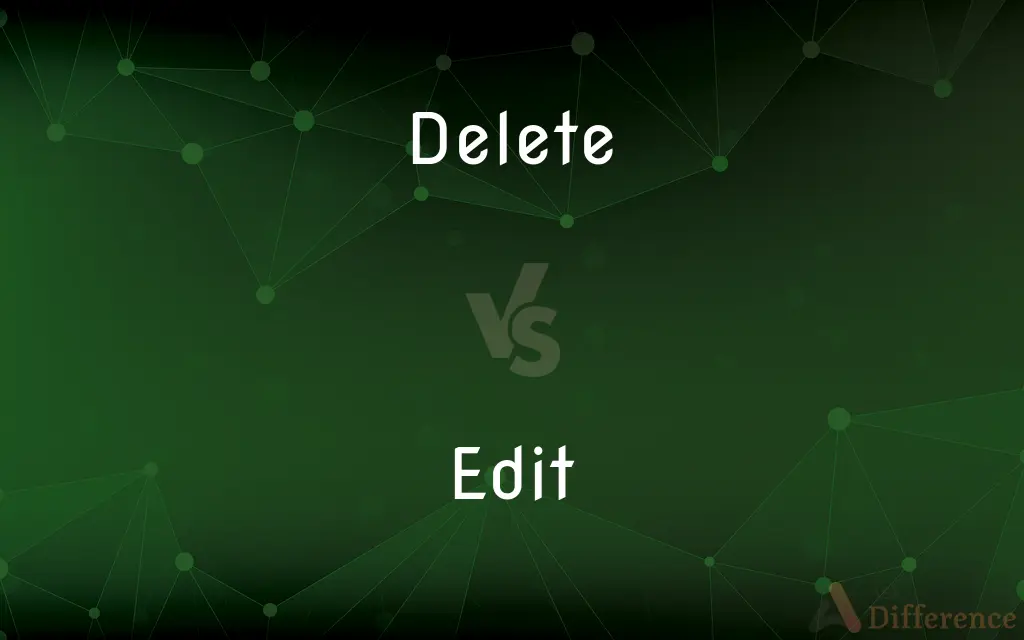Delete vs. Edit — What's the Difference?
By Tayyaba Rehman & Maham Liaqat — Updated on April 30, 2024
Deleting removes content or data permanently, while editing modifies existing content or data without removing it entirely.

Difference Between Delete and Edit
Table of Contents
ADVERTISEMENT
Key Differences
Deleting is the act of permanently removing data, files, or content, effectively erasing it from existence in its current form. In contrast, editing involves making changes to the existing material, whether to update, correct, or improve it, but the original content is not completely eliminated.
While deletion is final and often used to clear space or remove unnecessary or sensitive information, editing allows for refinement and adaptation, maintaining the essence of the original content but altering specific details. This distinction highlights deletion as a subtractive process and editing as an additive or transformative process.
The implications of deleting vs. editing can be significant, particularly in digital contexts. Deleting a file or a piece of data can sometimes be irreversible, depending on the system, whereas editing can be undone or revised multiple times to refine the outcome.
In practical applications, deletion is straightforward—once something is deleted, it is gone, potentially freeing up space or removing outdated content. Editing, however, requires judgment and decision-making about what changes need to be made to enhance or correct the content.
From a user experience perspective, tools for deletion are usually simple, such as a delete button or command, while editing tools can range from basic text formatting to complex software features that allow significant modifications in content creation or data management.
ADVERTISEMENT
Comparison Chart
Definition
Permanent removal of data or content
Modification or correction of existing content
Nature
Subtractive
Additive or transformative
Reversibility
Often irreversible
Typically reversible
Tools Required
Simple delete commands
Advanced editing tools or software
Outcome
Frees up space, removes content
Refines, updates, or corrects content
Compare with Definitions
Delete
The delete function is critical in managing digital clutter.
Regularly deleting unused apps can improve device performance.
Edit
Editing involves altering existing content to improve or update it.
He edited the document to correct the typos.
Delete
Deleting refers to the complete removal of content or data.
She deleted the old files to free up disk space.
Edit
Edits can be minor, like punctuation, or major, involving restructuring.
She edited the article extensively to enhance clarity.
Delete
Deletion is used to permanently erase sensitive information.
Companies often delete data to comply with privacy policies.
Edit
Editing tools vary from simple text editors to complex software.
Graphic designers use sophisticated software to edit images.
Delete
Once deleted, recovery can be difficult or impossible.
Deleted photos may be unrecoverable without a backup.
Edit
Editing is a fundamental part of content creation and management.
Editors review and revise content before publication.
Delete
Deleting can be done in various contexts, from files to messages.
Deleting an email removes it from your inbox permanently.
Edit
Revisions through editing can be tracked in many digital platforms.
Document editing software often includes change tracking features.
Delete
To remove, get rid of or erase, especially written or printed material, or data on a computer or other device.
Edit
An act or instance of editing
Made several last-minute edits for reasons of space.
Delete
To defeat or dominate.
Edit
A change to the text of a document.
Delete
To cancel, strike out, or make impossible to be perceived
Deleted the expletives from the transcript with a marker.
Edit
To prepare (written material) for publication or presentation, as by correcting, revising, or adapting.
Delete
To remove from a document or record
Deleted the names from the computer file.
Edit
To prepare an edition of for publication
Edit a collection of short stories.
Delete
To remove (a file, for example) from a hard drive or other storage medium.
Edit
To modify or adapt so as to make suitable or acceptable
Edited her remarks for presentation to a younger audience.
Delete
To kill or murder.
Edit
To supervise the publication of (a newspaper or magazine, for example).
Delete
(computing) A deletion.
Edit
To assemble the components of (a film or soundtrack, for example), as by cutting and splicing.
Delete
(recorded entertainment industry) A remainder of a music or video release.
Edit
(computing) A change in the text of a file, a website or the code of software.
Delete
(uncountable) Delete
Edit
An edited piece of media, especially video footage.
An early edit of the film included a romantic subplot.
Delete
(computing) The delete character (U+007F or %7F).
Edit
(comedy) An interruption or change to an improvised scene.
Delete
To blot out; to erase; to expunge; to dele; to omit.
I have, therefore, . . . inserted eleven stanzas which do not appear in Sir Walter Scott's version, and have deleted eight.
Edit
(genetics) An alteration to the DNA sequence of a chromosome; an act of gene splicing.
Delete
Remove or make invisible;
Please delete my name from your list
Edit
To change a text, or a document.
Your speech is too long. You need to edit it.
Delete
Wipe out magnetically recorded information
Edit
To alter a photograph or recording of sound or video.
We shot an hour-long interview then edited it down to 45 minutes.
Delete
Cut or eliminate;
She edited the juiciest scenes
Edit
(transitive) To be the editor of a publication.
He edits the Chronicle.
Edit
(computing) To change the contents of a file, website, etc.
Wikipedia is an interactive encyclopedia which allows anybody to edit and improve articles.
Edit
(biology) To alter the DNA sequence of a chromosome; to perform gene splicing.
Edit
To assemble a film by cutting and splicing raw footage.
Edit
(comedy) To cut short or otherwise alter an improvised scene.
Edit
(ergative) To lend itself to editing in a certain way.
Edit
To superintend the publication of; to revise and prepare for publication; to select, correct, arrange, etc., the matter of, for publication; as, to edit a newspaper.
Philosophical treatises which have never been edited.
Edit
Prepare for publication or presentation by correcting, revising, or adapting;
Edit a a book on lexical semantics
She edited the letters of the politician so as to omit the most personal passages
Edit
Supervise the publication of;
The same family has been editing the influential newspaper for almost 100 years
Edit
Cut and assemble the components of;
Edit film
Cut recording tape
Edit
Cut or eliminate;
She edited the juiciest scenes
Common Curiosities
What does it mean to delete something?
Deleting something means permanently removing it from a system or database, ensuring it no longer exists in its previous form.
Can deleted data be recovered?
In some cases, deleted data can be recovered if not overwritten, but often deletion is designed to be permanent.
How do delete and edit functions differ in software?
Delete functions remove content permanently, while edit functions provide tools to change and improve existing content.
What is the purpose of editing?
Editing is intended to modify, correct, or update existing content or data to make it more accurate, relevant, or effective.
Why might someone choose to edit rather than delete?
Editing is chosen over deleting when the overall content remains valuable or relevant, but needs refinement or correction.
What are the risks of deleting vs. editing?
Deleting carries the risk of removing data irreversibly, while editing risks are generally related to improper changes that might alter the intended message or function.
Is editing more time-consuming than deleting?
Yes, editing can be more time-consuming as it involves thoughtful changes and reviews to ensure accuracy and effectiveness.
How does deletion affect storage?
Deletion frees up storage space by removing data permanently.
What tools are used for deleting vs. editing?
Simple delete keys or commands are used for deletion, while editing may require more complex software or tools depending on the content.
What impact does deleting have on digital privacy?
Deleting sensitive information can enhance digital privacy by permanently erasing data that could be potentially
Share Your Discovery

Previous Comparison
Fibrosis vs. Sclerosis
Next Comparison
Tumbao vs. CongaAuthor Spotlight
Written by
Tayyaba RehmanTayyaba Rehman is a distinguished writer, currently serving as a primary contributor to askdifference.com. As a researcher in semantics and etymology, Tayyaba's passion for the complexity of languages and their distinctions has found a perfect home on the platform. Tayyaba delves into the intricacies of language, distinguishing between commonly confused words and phrases, thereby providing clarity for readers worldwide.
Co-written by
Maham Liaqat










































